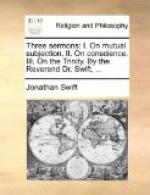From all that hath been hitherto said it appears that great abilities of any sort, when they are employed as God directs, do but make the owners of them greater and more painful servants to their neighbour and the public. However, we are by no means to conclude from hence that they are not really blessings, when they are in the hands of good men. For, first, what can be a greater honour than to be chosen one of the stewards and dispensers of God’s bounty to mankind? What is there that can give a generous spirit more pleasure and complacency of mind than to consider that he is an instrument of doing much good; that great numbers owe to him, under God, their subsistence, their safety, their health, and the good conduct of their lives? The wickedest man upon earth takes a pleasure in doing good to those he loves; and therefore surely a good Christian, who obeys our Saviour’s commands of loving all men, cannot but take delight in doing good even to his enemies. God, who gives all things to all men, can receive nothing from any; and those among men who do the most good and receive the fewest returns do most resemble the Creator; for which reason St. Paul delivers it as a saying of our Saviour, that “it is more blessed to give than receive.” By this rule, what must become of those things which the world values as the greatest blessings—riches, power, and the like--when our Saviour plainly determines that the best way to make them blessings is to part with them? Therefore, although the advantages which one man hath over another may be called blessings, yet they are by no means so in the sense the world usually understands. Thus, for example, great riches are no blessings in themselves, because the poor man, with the common necessaries of life, enjoys more health and has fewer cares without them. How then do they become blessings? No otherwise than by being employed in feeding the hungry, clothing the naked, rewarding worthy men, and, in short, doing acts of charity and generosity. Thus, likewise, power is no blessing in itself, because private men bear less envy, and trouble, and anguish without it. But when it is employed to protect the innocent, to relieve the oppressed, and to punish the oppressor, then it becomes a great blessing.
And so, lastly, even great wisdom is, in the opinion of Solomon, not a blessing in itself; for “in much wisdom is much sorrow;” and men of common understanding, if they serve God and mind their callings, make fewer mistakes in the conduct of life than those who have better heads. And yet wisdom is a mighty blessing when it is applied to good purposes, to instruct the ignorant, to be a faithful counsellor either in public or private, to be a director to youth, and to many other ends needless here to mention.
To conclude: God sent us into the world to obey His commands, by doing as much good as our abilities will reach, and as little evil as our many infirmities will permit. Some He hath only trusted with one talent, some with five, and some with ten. No man is without his talent; and he that is faithful or negligent in a little shall be rewarded or punished, as well as he that hath been so in a great deal.




